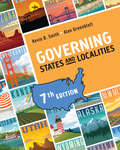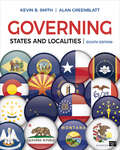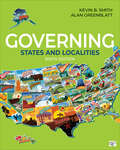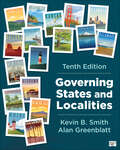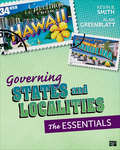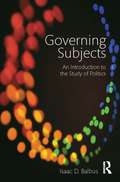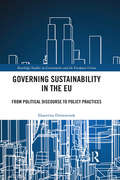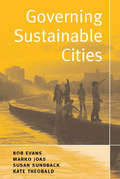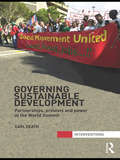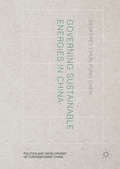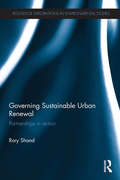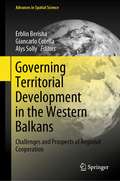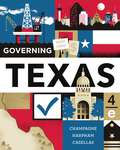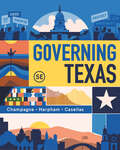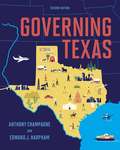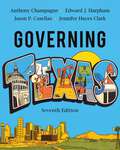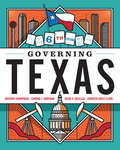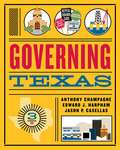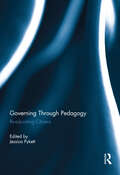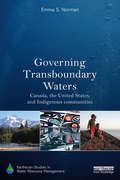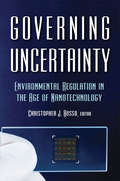- Table View
- List View
Governing States and Localities
by Kevin B. Smith Alan H. GreenblattThe trusted and proven Governing States and Localities guides you through the contentious environment of state and local politics and focuses on the role that economic and budget pressures play on issues facing state and local governments. With their engaging journalistic writing and crisp storytelling, Kevin B. Smith and Alan Greenblatt employ a comparative approach to explain how and why states and localities are both similar and different. The Seventh Edition is thoroughly updated to account for such major developments as state vs. federal conflicts over immigration reform, school shootings, and gun control; the impact of the Donald Trump presidency on intergovernmental relations and issues of central interest to states and localities; and the lingering effects of the Great Recession.
Governing States and Localities
by Kevin B. Smith Alan H. GreenblattFrom the implications of Donald Trump’s presidency on intergovernmental relations to the COVID-19 pandemic’s impact on state-federal relations, the Eighth Edition of Governing States and Localities introduces students to the most recent challenges, developments, and political changes impacting state and local politics. Employing a comparative approach, bestselling authors Kevin B. Smith and Alan Greenblatt illustrate the similarities and differences in the way state and local governments operate to show students the real-world application of policy and politics. Following a crisp journalistic style with magazine-quality graphics and top-ten takeaways per chapter that keep students engaged, this edition provides a comprehensive introduction to state and local governments that is easily accessible to undergraduates in a variety of majors. This title is accompanied by a complete teaching and learning package. Contact your SAGE representative to request a demo. Digital Option / Courseware SAGE Vantage is an intuitive digital platform that delivers this text’s content and course materials in a learning experience that offers auto-graded assignments and interactive multimedia tools, all carefully designed to ignite student engagement and drive critical thinking. Built with you and your students in mind, it offers simple course set-up and enables students to better prepare for class. Assignable Video with Assessment Assignable video (available with SAGE Vantage) is tied to learning objectives and curated exclusively for this text to bring concepts to life. Watch a sample video now. LMS Cartridge: Import this title’s instructor resources into your school’s learning management system (LMS) and save time. Don’t use an LMS? You can still access all of the same online resources for this title via the password-protected Instructor Resource Site. Learn more.
Governing States and Localities
by Kevin B. Smith Alan H. GreenblattFrom the implications of Donald Trump’s presidency on intergovernmental relations to the COVID-19 pandemic’s impact on state-federal relations, the Eighth Edition of Governing States and Localities introduces students to the most recent challenges, developments, and political changes impacting state and local politics. Employing a comparative approach, bestselling authors Kevin B. Smith and Alan Greenblatt illustrate the similarities and differences in the way state and local governments operate to show students the real-world application of policy and politics. Following a crisp journalistic style with magazine-quality graphics and top-ten takeaways per chapter that keep students engaged, this edition provides a comprehensive introduction to state and local governments that is easily accessible to undergraduates in a variety of majors. This title is accompanied by a complete teaching and learning package. Contact your SAGE representative to request a demo. Digital Option / Courseware SAGE Vantage is an intuitive digital platform that delivers this text’s content and course materials in a learning experience that offers auto-graded assignments and interactive multimedia tools, all carefully designed to ignite student engagement and drive critical thinking. Built with you and your students in mind, it offers simple course set-up and enables students to better prepare for class. Assignable Video with Assessment Assignable video (available with SAGE Vantage) is tied to learning objectives and curated exclusively for this text to bring concepts to life. Watch a sample video now. LMS Cartridge: Import this title’s instructor resources into your school’s learning management system (LMS) and save time. Don’t use an LMS? You can still access all of the same online resources for this title via the password-protected Instructor Resource Site. Learn more.
Governing States and Localities
by Kevin B. Smith Alan H. GreenblattFrom the lingering but long-lasting effects of the COVID pandemic to the growing diffusion of partisan polarization through the various levels of government, the Ninth Edition of Governing States and Localities introduces students to the most recent challenges, developments, and political changes impacting state and local politics. Employing a comparative approach, bestselling authors Kevin B. Smith and Alan Greenblatt illustrate the similarities and differences in the way state and local governments operate to show students the real-world application of policy and politics. This edition keeps students engaged with a crisp journalistic style while providing a comprehensive introduction to state and local governments that is easily accessible to undergraduates in a variety of majors. This title is accompanied by a complete teaching and learning package. Contact your Sage representative to request a demo. Learning Platform / Courseware Sage Vantage is an intuitive learning platform that integrates quality Sage textbook content with assignable multimedia activities and auto-graded assessments to drive student engagement and ensure accountability. Unparalleled in its ease of use and built for dynamic teaching and learning, Vantage offers customizable LMS integration and best-in-class support. It’s a learning platform you, and your students, will actually love. Learn more. Assignable Video with Assessment Assignable video (available in Sage Vantage) is tied to learning objectives and curated exclusively for this text to bring concepts to life. Watch a sample video now. LMS Cartridge: Import this title’s instructor resources into your school’s learning management system (LMS) and save time. Don’t use an LMS? You can still access all of the same online resources for this title via the password-protected Instructor Resource Site. Learn more.
Governing States and Localities
by Kevin B. Smith Alan H. GreenblattFrom the lingering but long-lasting effects of the COVID pandemic to the growing diffusion of partisan polarization through the various levels of government, the Ninth Edition of Governing States and Localities introduces students to the most recent challenges, developments, and political changes impacting state and local politics. Employing a comparative approach, bestselling authors Kevin B. Smith and Alan Greenblatt illustrate the similarities and differences in the way state and local governments operate to show students the real-world application of policy and politics. This edition keeps students engaged with a crisp journalistic style while providing a comprehensive introduction to state and local governments that is easily accessible to undergraduates in a variety of majors. This title is accompanied by a complete teaching and learning package. Contact your Sage representative to request a demo. Learning Platform / Courseware Sage Vantage is an intuitive learning platform that integrates quality Sage textbook content with assignable multimedia activities and auto-graded assessments to drive student engagement and ensure accountability. Unparalleled in its ease of use and built for dynamic teaching and learning, Vantage offers customizable LMS integration and best-in-class support. It’s a learning platform you, and your students, will actually love. Learn more. Assignable Video with Assessment Assignable video (available in Sage Vantage) is tied to learning objectives and curated exclusively for this text to bring concepts to life. Watch a sample video now. LMS Cartridge: Import this title’s instructor resources into your school’s learning management system (LMS) and save time. Don’t use an LMS? You can still access all of the same online resources for this title via the password-protected Instructor Resource Site. Learn more.
Governing States and Localities
by Kevin B. Smith Alan H. GreenblattThe #1 book in the market for state and local politics! The trusted and proven Governing States and Localities guides students through the contentious status of state and local politics, helping them understand the ins and outs of these systems and why they′re important. With engaging journalistic writing and crisp storytelling, Kevin B. Smith and Alan Greenblatt use a comparative approach to examine how and why states and localities are both similar and different to showcase real-life applications of policy and politics. The Tenth Edition has been thoroughly updated to look at developments and issues in today′s hyperpartisan political environment. This text is offered in Sage Vantage, an intuitive learning platform that integrates quality Sage textbook content with assignable multimedia activities and auto-graded assessments to drive student engagement and ensure accountability. Unparalleled in its ease of use and built for dynamic teaching and learning, Vantage offers customizable LMS integration and best-in-class support.
Governing States and Localities
by Kevin B. Smith Alan H. GreenblattThe #1 book in the market for state and local politics! The trusted and proven Governing States and Localities guides students through the contentious status of state and local politics, helping them understand the ins and outs of these systems and why they′re important. With engaging journalistic writing and crisp storytelling, Kevin B. Smith and Alan Greenblatt use a comparative approach to examine how and why states and localities are both similar and different to showcase real-life applications of policy and politics. The Tenth Edition has been thoroughly updated to look at developments and issues in today′s hyperpartisan political environment. This text is offered in Sage Vantage, an intuitive learning platform that integrates quality Sage textbook content with assignable multimedia activities and auto-graded assessments to drive student engagement and ensure accountability. Unparalleled in its ease of use and built for dynamic teaching and learning, Vantage offers customizable LMS integration and best-in-class support.
Governing States and Localities: The Essentials
by Kevin B. Smith Alan Howard GreenblattIn this Essentials Edition of Governing States and Localities, authors Kevin Smith and Alan Greenblatt retain the hallmarks of their bestselling introductory text by blending the latest scholarship with engaging journalistic writing, crisp storytelling, and class-tested pedagogy. Based on market feedback, the authors distilled core topics and cut out policy coverage some instructors do not have time to cover, but kept the ever-important finance chapter and a beautiful full-color interior design. This value-priced, ten-chapter text utilizes the comparative approach to ensure that students walk away from the course understanding how and why states and localities are both similar and different in institutional structure, culture, history, geography, economy, and demographics
Governing Subjects: An Introduction to the Study of Politics
by Isaac D. BalbusThis introduction to the study of politics explores the multiple meanings of "governance" as well as the several senses of what it means to be a "subject." It takes the reader on a journey through and across the domains of law and institutions, markets and power, and culture and identity, and shows how the understanding of any one of these domains demands an understanding of them all. The path through these related regions is marked by regular encounters with leading and competing thinkers—from the expected, such as James Madison, Robert Dahl, Michel Foucault, and Adam Smith, to the unexpected, such as Joseph Raz, Lisa Disch, Doug Henwood, and Joan Scott—that encourage the reader to evaluate their arguments for their internal coherence and explanatory power. Governing Subjects is at once a holistic and critical introduction to the study of politics.
Governing Sustainability
by W. Neil Adger Andrew JordanThe crisis of unsustainability is, above all else, a crisis of governance. The transition to a more sustainable world will inevitably require radical changes in the actions of all governments, and it will call for significant changes to the lifestyles of individuals everywhere. Bringing together some of the world's most highly regarded experts on governance and sustainable development, this book examines these necessary processes and consequences across a range of sectors, regions and other important areas of concern. It reveals that the governance of sustainable development is politically contested, and that it will continue to test existing governance systems to their limits. As an assessment of existing policy practices, it will be of great interest to all those who are preparing themselves - or their organisations - for the sustainability transition.
Governing Sustainability in the EU: From Political Discourse to Policy Practices (Routledge Studies on Government and the European Union)
by Ekaterina DomorenokGoverning Sustainability in the EU examines the recent novelties in the EU agenda for sustainable development, illustrating how the process of policy change has occurred at different levels, comprising general priorities, specific objectives and policy instruments. The book focuses on the evolution of the principle of policy integration and analyses its implementation by specific policy instruments across three policy areas: energy efficiency (the Covenant of Mayors), innovation (the Eco-Innovation Programme) and regional development (ERDF regional programmes regarding sustainable urban development). It specifically examines two domestic contexts (Italy and the UK) with the aim of understanding how the goals and means envisaged by the EU have been translated into concrete policy practices on the ground, and which factors have influenced the creation of new policy and governance practices necessary for the achievement of sustainable development objectives. This text will be of key interest to scholars, students and practitioners of sustainable development, European Union Politics, and Environmental Politics.
Governing Sustainable Cities
by Bob Evans Marko Joas Susan Sundback Kate TheobaldUrban governance and sustainability are rapidly becoming key issues around the world. Currently three billion people - half the population of the planet - live in cities, and by 2050 a full two-thirds of the world's population will be housed in ever larger and increasingly densely populated urban areas. The economic, social and environmental challenges posed by urbanization on such a large scale and at such a rapid pace are staggering for local, regional and national governments working towards sustainability. Solutions to the myriad problems plaguing the quest for sustainability at the city-level are equally as diverse and complex, but are rooted in the assumptions of the 'sustainability agenda', developed at the Rio Earth Summit and embodied in Local Agenda/Action 21. These assumptions state that good governance is a necessary precondition for the achievement of sustainable development, particularly at the local level, and that the mobilization of local communities is an essential part of this process. Yet until now, these assumptions, which have guided the policies and programmes of over 6000 local authorities around the world, have never been seriously tested. Drawing on three years of field research in 40 European towns and cities, Governing for Sustainable Cities is the first book to examine empirically the processes of urban governance in sustainable development. Looking at a host of core issues including institutional and social capacity, institutional design, social equity, politics, partnerships and cooperation and creative policy-making, the authors draw compelling conclusions and offer strong guidance. This book is essential reading for policy-makers, politicians, activists and NGOs, planners, researchers and academics, whether in Europe, North America, Australasia or transitional and developing countries, concerned with advancing sustainability in our rapidly urbanizing world.
Governing Sustainable Development: Partnerships, Protests and Power at the World Summit (Interventions)
by Carl DeathMultilateral UN summits from Stockholm to Copenhagen have set the pace and direction for the global governance of sustainable development. The 2002 Johannesburg World Summit on Sustainable Development (WSSD) was a key moment in the evolution of sustainable development as a discourse and summitry as a technology of government. It firmly established multi-stakeholder partnerships, carbon-trading and communication strategies as primary techniques for dealing with environmental crises. It was also a significant event in terms of South African domestic politics, witnessing some of the largest protests since the end of Apartheid. Carl Death draws on Foucauldian governmentality literature to argue that the Johannesburg Summit was a key site for the refashioning of sustainable development as advanced liberal government; for the emergence of an exemplary logic of rule; and for the mutually interdependent relationship between ‘mega-events’ (summits, world cups, Olympic games) and ‘mega-protests’ understood as Foucauldian counter-conducts. Analysing detailed and original research on the WSSD, Death argues that summits work to make politically sustainable a global order which is manifestly unsustainable. Paradoxically however, they also provide opportunities for the status quo to be protested and resisted. This work will be of great interest to scholars of development studies, global governance and environmental politics.
Governing Sustainable Energies in China
by Geoffrey Chun-fung ChenThis book examines sustainable energy development in China, a non-liberal state, as a counterexample to conventional wisdom that effective policy outcomes are premised on the basis of decentralized governance. The use of sustainable energies as part of the solution for stabilising global warming has been promoted in industrialised countries for the past three decades. In the last ten years, China has expanded its renewable energy capacity with unprecedented speed and breadth. This phenomenon seems to contradict the principle of orthodox environmental governance, in which stakeholder participation is deemed a necessary condition for effective policy outcomes. Based upon policy documents, news report and interviews with 32 policy makers, business leaders, and NGO practitioners in selected subnational governments, this book examines the politics of sustainable energy in China. It engages debates over the relationships among democratic prioritisation, environmental protection, and economic empowerment, arguing that China's quasi-corporatist model in the sustainable energy field challenges Western scholars' dominant assumptions about ecopolitics.
Governing Sustainable Urban Renewal: Partnerships in Action (Routledge Explorations in Environmental Studies)
by Rory ShandEnvironmental and sustainability issues are currently stretched by economic concerns and policy areas such as housing and education are therefore needed more than ever to help regenerate the social and urban environment. Governing Sustainable Urban Renewal: Partnerships in Action uses detailed case studies from the UK, Germany and USA to explore the effect of institutional design and modes of governance and evaluates policy outputs, outcomes and best practice. In doing so, it illustrates where power and decision making lies in the delivery of urban renewal initiatives and examines the roles for communities in the governance process. The analysis offers insight into the formation of partnerships and networks that can help to overcome many of the obstacles faced in urban renewal and in the promotion of sustainable development in core urban areas. Given the increasing commitment of governments throughout the world to renewal as a means for resolving entrenched environmental, social and governance problems, this timely new study should be of interest to students and researchers across a range of disciplines including environment studies, geography, public policy, governance and politics, sustainable development, planning and urban studies.
Governing Territorial Development in the Western Balkans: Challenges and Prospects of Regional Cooperation (Advances in Spatial Science)
by Giancarlo Cotella Erblin Berisha Alys SollyThis book offers a multifaceted overview of the evolution of spatial development, governance and planning in the Western Balkans from an institutionalist perspective. Written by experts in the field, it features various regional and national studies covering topics such as regional and spatial planning, territorial development and governance, and regional and cross-border cooperation in the Western Balkans. Offering a wealth of national, regional and local insights on territorial cooperation, development and planning, this book will appeal to scholars in regional and spatial sciences and related fields alike.
Governing Texas
by Jason P. Casellas Anthony Champagne Edward J. HarphamThe most trusted source for comprehensive coverage. The text and its groundbreaking InQuizitive course get students to think critically about recent political controversies. Students will analyze public opinion data with new “What Do Texans Think?” features. And a new chapter, “Building the Future: Public Policies for a Changing Texas,” asks students to grapple with the big issues that will shape the future of Texas political life: education, immigration, transportation, and water.
Governing Texas (Fifth Edition)
by Jason P. Casellas Anthony Champagne Edward J. HarphamA comprehensive “Citizen’s Guide” to Texas politics and government Governing Texas is the most trusted source for accurate, comprehensive coverage. With its new “Citizen’s Guide” features and popular infographics, Governing Texas inspires students to think critically about recent political controversies and become more informed voters and political participants. This purchase offers access to the digital ebook only.
Governing Texas (Second edition)
by Anthony Champagne Edward J. HarphamGoverning Texas, Second Edition, offers extensive, easy-to-use tools to help students understand the basics of Texas politics and compare Texas to other states, and to help instructors assess students on state-mandated learning outcomes.
Governing Texas (Seventh Edition)
by Jason P. Casellas Anthony Champagne Edward J. Harpham Jennifer Hayes ClarkThe #1 book, with a new chapter on media and the most engaging digital learning experience The best-selling book for Texas government courses provides accessible, comprehensive coverage of how Texas government works, and includes vivid examples that illustrate the dynamism and relevance of Texas politics today. Written by an author team of engaged instructors who are active in political science, experienced in the classroom, and passionate about Texas politics, the Seventh Edition adds an exciting new chapter on Public Opinion and the Media, exploring the interplay between public opinion and public policy in Texas and the role that national and local media play in Texas politics. The Norton Illumine Ebook highlights the book’s key strengths with new videos and interactive features designed to engage students in the content, help them think critically, and keep them focused on chapter learning goals. This purchase offers access to the digital ebook only.
Governing Texas (Sixth Edition)
by Jason P. Casellas Anthony Champagne Edward J. Harpham Jennifer Hayes ClarkThe #1 book, featuring a dynamic new voice Governing Texas is the most trusted source for accurate, comprehensive coverage. New coauthor Jennifer Clark (University of Houston) draws on her expertise in state politics and teaching Texas government to integrate engaging new examples, including new How Are Texans Represented? features. The Sixth Edition’s new Check Your Understanding questions in the Norton Illumine Ebook, popular InQuizitive course, and comprehensive assessment and teaching resources make Governing Texas the ideal choice for any classroom experience. This purchase offers access to the digital ebook only.
Governing Texas (Third Edition)
by Jason P. Casellas Anthony Champagne Edward J. HarphamThe #1 selling book for Texas government courses, with a new focus on the future of Texas politics. Governing Texas is comprehensive, clear, and current. The Third Edition, with new coauthor Jason Casellas, builds on these strengths and has a new theme: the future of Texas. How is Texas changing? How will politics and government change with it? Governing Texas helps students think critically about these essential questions.
Governing Through Pedagogy: Re-educating Citizens
by Jessica PykettThis edited collection brings together researchers from education, human geography, sociology, social policy and political theory in order to consider the idea of the ‘pedagogical state’ as a means of understanding the strategies employed to re-educate citizens. The book aims to critically interrogate the cultural practices of governing citizens in contemporary liberal societies. Governing through pedagogy can be identified as an emerging tactic by which both state agencies and other non-state actors manage, administer, discipline, shape, care for and enable liberal citizens. Hence, discourses of ‘active citizenship’, ‘participatory democracy’, ‘community empowerment’, ‘personalised responsibility’, ‘behaviour change’ and ‘community cohesion’ are productively viewed through the conceptual lens of the pedagogical state. Chapters consider the spaces of schools, universities, the voluntary sector, civil society organisations, parenting initiatives, the media, government departments and state agencies as fruitful empirical sites through which pedagogy is worked and re-worked. This book was originally published as a special issue of Citizenship Studies.
Governing Transboundary Waters: Canada, the United States, and Indigenous Communities (Earthscan Studies in Water Resource Management)
by Emma S. NormanWinner of the Political Geography Specialty Group's 2015 Julian Minghi Distinguished Book Award! With almost the entire world’s water basins crossing political borders of some kind, understanding how to cooperate with one’s neighbor is of global relevance. For Indigenous communities, whose traditional homelands may predate and challenge the current borders, and whose relationship to water sources are linked to the protection of traditional lifeways (or ‘ways of life’), transboundary water governance is deeply political. This book explores the nuances of transboundary water governance through an in-depth examination of the Canada-US border, with an emphasis on the leadership of Indigenous actors (First Nations and Native Americans). The inclusion of this "third sovereign" in the discussion of Canada-U.S. relations provides an important avenue to challenge borders as fixed, both in terms of natural resource governance and citizenship, and highlights the role of non-state actors in charting new territory in water governance. The volume widens the conversation to provide a rich analysis of the cultural politics of transboundary water governance. In this context, the book explores the issue of what makes a good up-stream neighbor and analyzes the rescaling of transboundary water governance. Through narrative, the book explores how these governance mechanisms are linked to wider issues of environmental justice, decolonization, and self-determination. To highlight the changing patterns of water governance, it focuses on six case studies that grapple with transboundary water issues at different scales and with different constructions of border politics, from the Pacific coastline to the Great Lakes.
Governing Uncertainty: Environmental Regulation in the Age of Nanotechnology
by Christopher BossoNanotechnology promises to transform the materials of everyday life, leading to smaller and more powerful computers, more durable plastics and fabrics, cheap and effective water purification systems, more efficient solar panels and storage batteries, and medical devices capable of tracking down and killing cancer cells or treating neurological diseases. Policy analysts predict a radical change in the industrial sector; at present, the U.S. government spends nearly $2 billion annually on nanotechnology research and development. Yet the nanotechnology revolution is not straightforward. Enthusiasm about nanotechnology?s future is tempered by recognition of the hurdles to its responsible development, including the capacity of government to support technological innovation and economic growth while also addressing potential environmental and public health impacts. This is the first volume to engage scholarly perspectives on environmental regulation in light of the challenges posed by nanotechnology. Contributors focus on the overarching lessons of decades of regulatory response, while posing a fundamental question: How can government regulatory systems satisfy the desire for scientific innovation while also taking into account the direct and indirect effects of 21st century emerging technologies, particularly in the face of scientific uncertainties? With perspectives from economics, history, philosophy, and public policy, this new resource illuminates the various challenges inherent in the development of nanotechnology and works towards a reconceptualization of government regulatory approaches.
